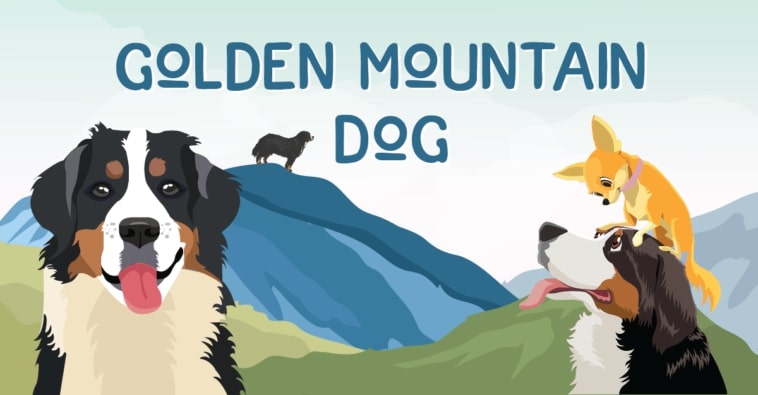Pets
Things To Know Before Bringing A Golden Mountain Dog Home
Golden Mountain Dog General Information:
The dogs, mixed breeds, are perfect for families as they are loyal, intelligent, extremely friendly and affectionate dogs.
They enjoy being surrounded by people and being with children, adults and the elderly.
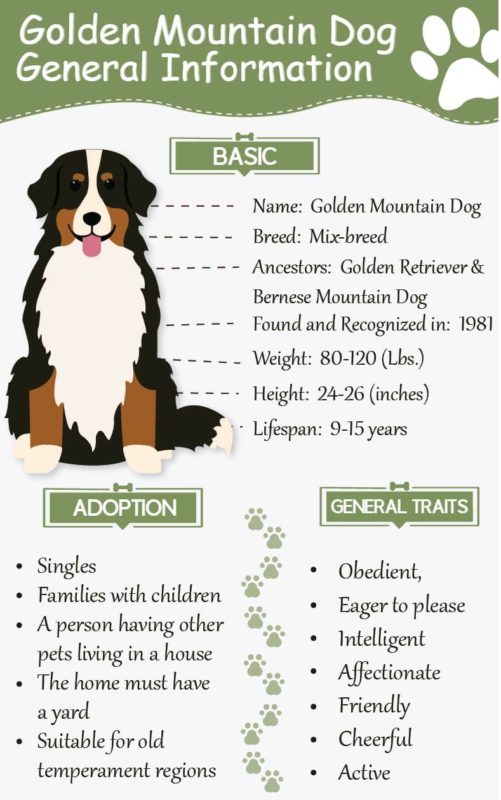
See below for all mixed dog breed traits and facts about Golden Mountain Dogs!
Table of Contents
Golden Mountain Dog – Quality Pet Why?
The Golden Mountain Dog is a mixed breed of dog that is a healthy hybrid between the Golden Retriever and the Bernese Mountain Dog. (Golden Mountain Dog)
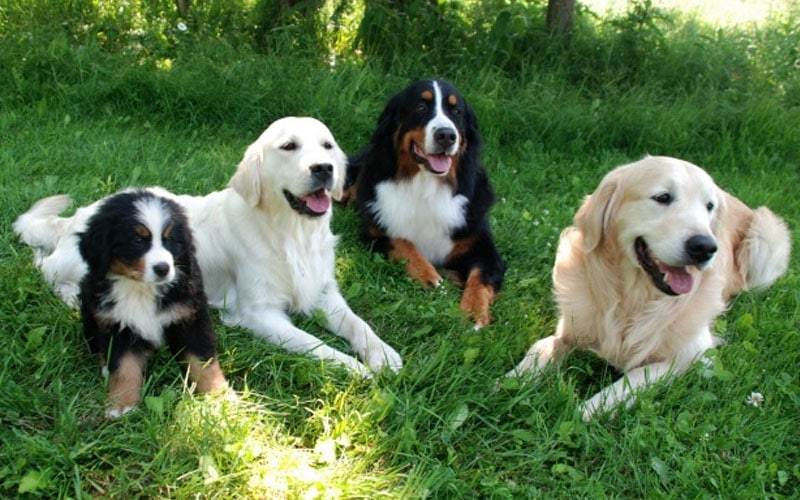
Golden mountain mix puppies inherit the best qualities from their parents and eventually become gentle, friendly, loyal and intelligent dogs.
The Bernese Mountain Dog and Golden Retriever have mixed temperaments, so mixed breed babies seem to be excellent pets:
Loyal to protect, affectionate with children, intelligent to learn and ready to please everyone, they are simply wonderful family dogs. (Golden Mountain Dog)
Golden Mountain Dog Breed Appearance:
Golden mountain dogs are impressively large dogs, up to 26 inches in length. They have a denser coat that hides their well-proportioned powerful body.
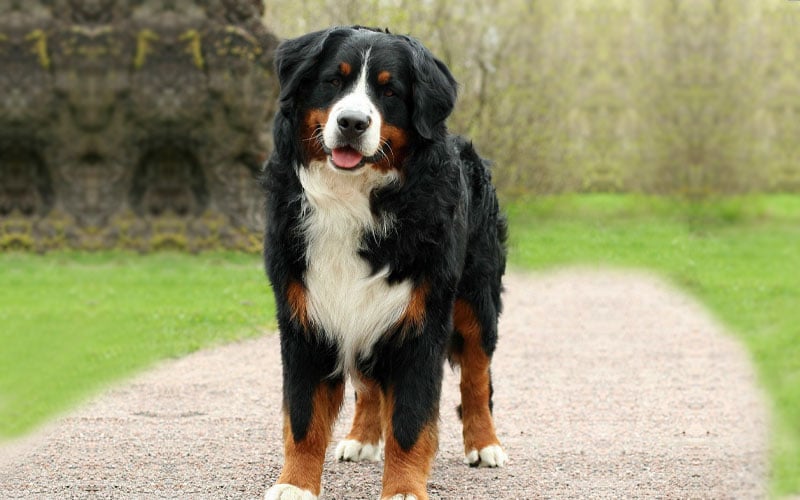
Its fluffy coat is long and makes the dog look even bigger, making it an excellent dog carrier and guard.
On the other hand, the appearance of Golden Mountain puppies depends on the generation of the cross.
E.g:
If it is a first-generation hybrid, the dog will have 50/50 similarity to both parents.
A multi-generational cross dog will change in appearance. (Golden Mountain Dog)
1. Facial Chops:
Golden mountain dogs have almond-shaped eyes, smaller muzzles, and drooping large elder ears. Their tails are constantly wagging and they get very excited when they meet new people.
For height and weight: Golden mountain dogs can be between 24 and 28 inches tall, while female dogs are smaller than males. The dog’s weight is between 80 pounds and 120 pounds.
2. Coat:
The fur of Golden Mountain Puppies is long, dense and straight but hardens very quickly and requires a lot of care such as bathing and grooming.
The color of the GMD coating can be: Brown, Black, White
In rare cases, the fur can also be of two colors. (Golden Mountain Dog)
Lifespan – Can Be Enhanced
The average Bernese Mountain Dog Lifespan is between 9 and 15 years.
The best thing is that the golden mountain dog’s lifespan can be extended to 15 years.
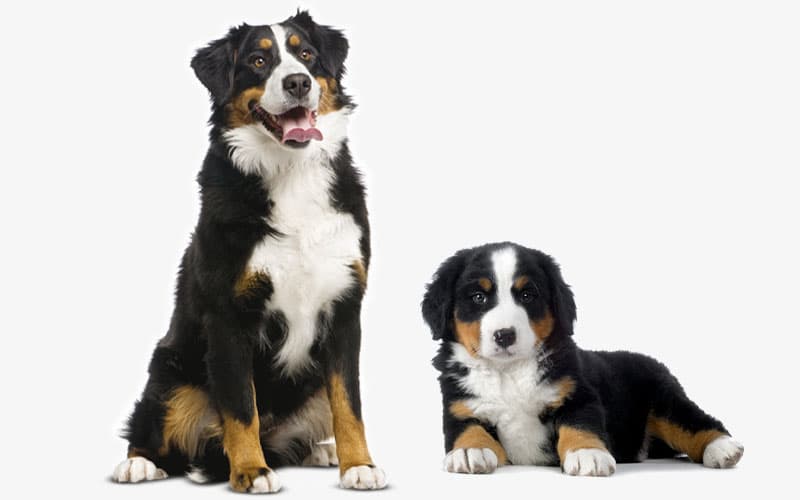
For this, you will have to follow a strict and particular health guide.
“Dogs’ lives are too short. Their only fault, really.” – Agnes Sligh Turnbull
Golden Mountain dogs are though healthy dogs but, with time, they start to show signs of aging. (Golden Mountain Dog)
If you see signs of aging, immediately take these steps and enhance lifespan of your dog:
- Take good care at home
- Keep a check on its diet
- Conduct regular health checkups
- Listen to the doctor’s advice carefully
- Keeping up active routine – exercise, walk, and playfulness
Also;
- Make up the mind of your pet.
- Encourage a sense of living in them
- Do not let your pooches feel depressed.
By doing so, you will see your dogs living longer.
Golden Mountain Dog Health Conditions:
Like its parent breeds, the puppy golden mountain dog is susceptible to health conditions such as epilepsy, cancer, eye problems, bloating, cancer, heart problems and von Willebrand disease.
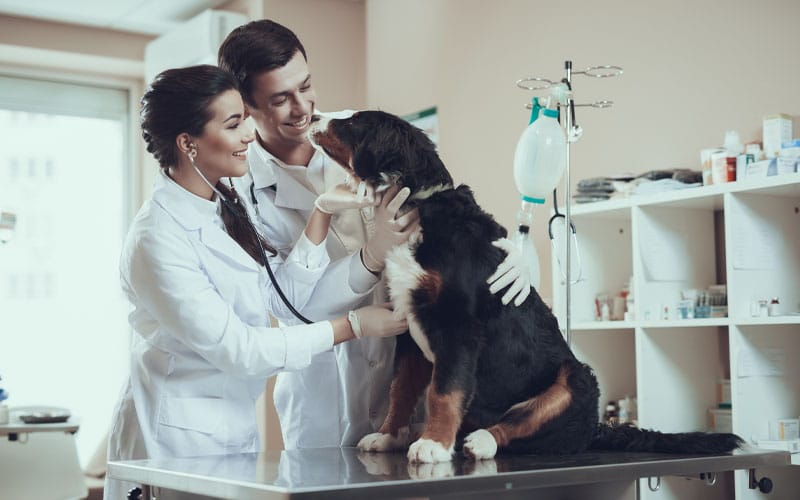
Crossbreeds of two different types of dogs inherit not only good traits, but also weaknesses.
To help protect your dog from suffering and certain health conditions, be sure to take good care of your dog and follow a proper routine:
Remember what Kinky Friedman said:
“Money can buy you a fine dog, but only love can make him wag his tail.”
For this, ensure:
1. Regular Health checkup:
Vet checkups are necessary to maintain a good health routine for your dog.
You need to pay visits to health specialists from time to time.
Besides this, on occasions when your pet shows a disturbing behavior such as unusual howling, being inactive, or showing less interest in food. (Golden Mountain Dog)
2. Exercise / Active Routine:
Golden Mountain dogs are so much in love with food and being active.
Golden Mountain pets have inherited active souls from their parents who have lived over mountains and in farms, and been used during hunting.
They love hanging around; however, you will have to develop a routine of regular activism in your pets.
For this:
- Take them for a walk on a regular basis with you
- Golden Mountain adult dogs are best for trekking, trailing, and hiking
- Take them on different types of pedestrian trips with you.
- If you are busy, hire someone to take your dog for a walk
Golden mountain dogs can show severe behavioral issues when not active.
It happens because these dogs have so much energy in their bodies, and they want to consume it by walking and running.
If you don’t give them a chance to chomp it, they will start playing around the home and pull your pants outside.
Grooming Your Golden Mountain Dogs – How:
To help your golden mountain dogs stay happy and healthy, follow the proper routine as follows:
Keep your Golden Mountain Dog clean and safe from germs and insect attacks as well as major health issues.
You should not use the ordinary shampoo you use for yourself for your pet.
Pet shampoos contain unique extracts that keep insects away from them.
Also, use a dog-friendly pool when cleaning your pet. Take care to trim their nails and clean their paws properly.
After cleaning, you will have to make special efforts with the coat.
Be sure to groom your dog and always use special pet products.
If you don’t want to spend a lot of time and money on grooming, consider the Red Boston Terrier.
By doing this you can see the constructive health signs.
Keep a check on Amount to Feed A Golden Mountain Dog / Puppy?
Just as it is wrong to feed your pet less meals than it needs, it is also not good to feed it over time.
1. Feed Nutrition Rich Food:
Consult the breeder, the veterinarian and always buy food enriched with all the essential vital nutrients your pet needs.
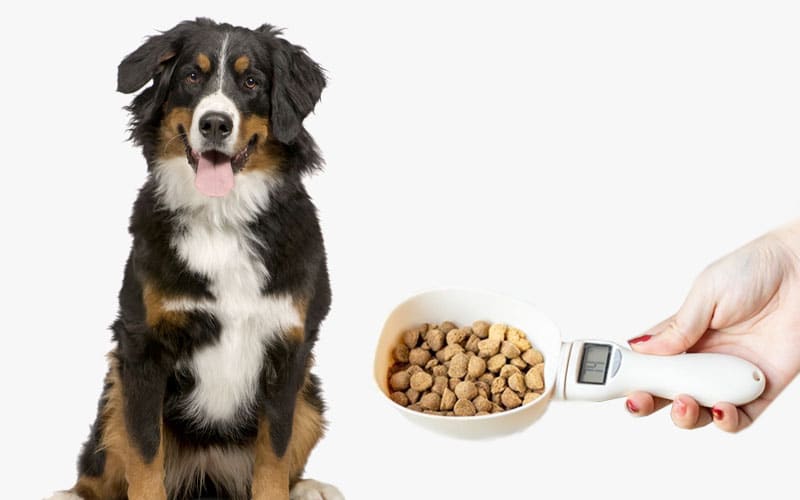
When choosing food for your dog, you should see what and which foods your dog happily eats.
However, you should never forget that not all people’s food is suitable dogs, cats, and other pets.
By doing this you can see the constructive health signs.
2. Servings:
Golden Mountain Dog needs two meals a day.
With more meals you will only make him fatter, a health issue that can shorten the lifespan of a Golden Mountain pet. The same is true for feeding fewer meals.
3. Quantity:
Depending on their size, they need 3 to 5 glasses of dry food every day.
Golden Mountain dog For watchdogging – Suitable?
Golden Mountain dogs are not guard dogs.
GMDs have the heart of a bird and just feel comfortable in the house.
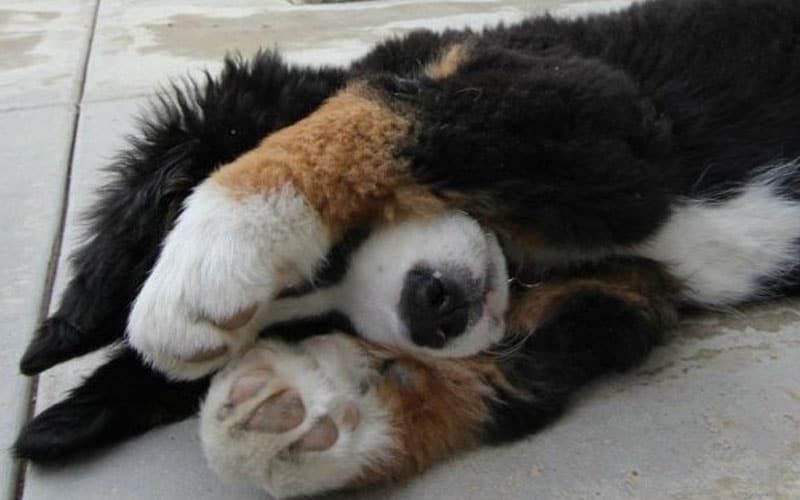
Even when you see a danger, they will hide before you.
Because they are just like children and act like children.
However, this does not mean that your Golden Mountain dog does not show love and affection.
He just expects you to be his lifesaver.
Particular temperatures and weather conditions for this breed?
The fluffy and dense coat of Golden Mountain Pooches will never let them keep up with the temperature.
Don’t take them out for a walk in the summer because the humidity will knock them out.
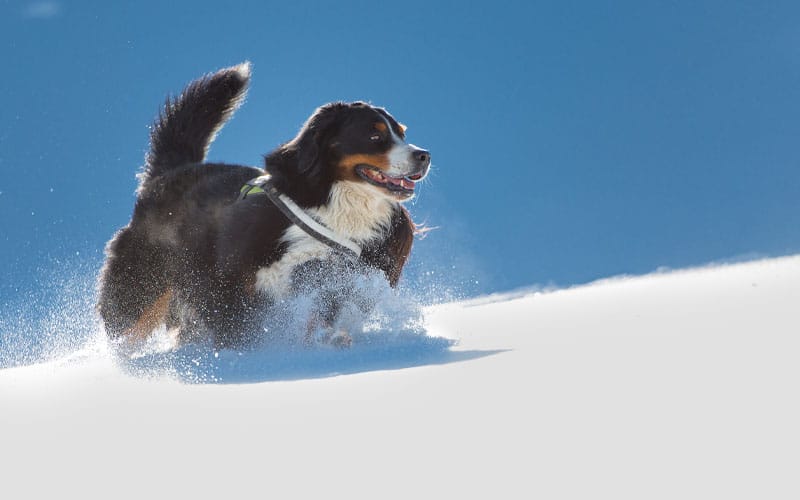
Even in winter, they cannot walk much on warm mornings; it is evening time.
Its body stays warm throughout the year.
Also, Golden Mountains dogs are considered the best breed for regions with cold climates.
Golden Mountain Dogs Are Whole Family Favorites: How?
Golden Mountain dogs are incredibly affectionate, affectionate, friendly, intelligent and calming dogs.
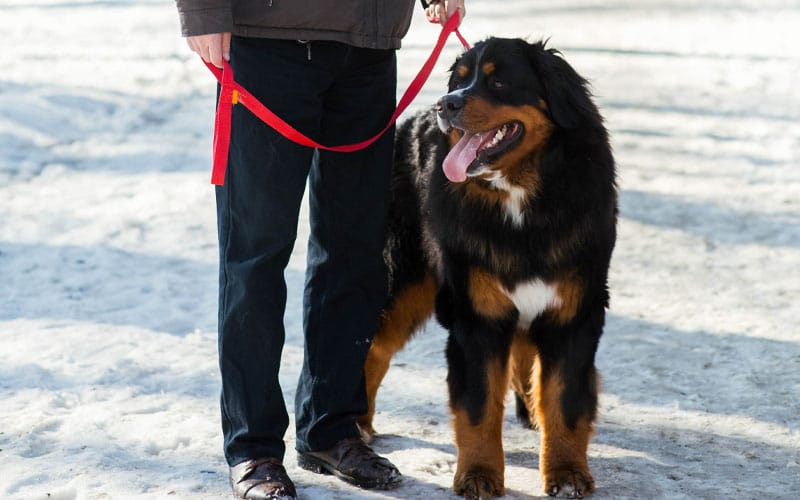
The traits that make them the most suitable pets for all ages and people living in all conditions.
- If you are living single, you will have someone beside you, 24×7 to never leave you alone.
- If you live with family, these tail-waggers will become the apple of the eye for all of your home members.
- They are so affectionate towards kids like a big brother and try to protect them from all the genders.
- These pets are so well-behaved that they can teach your kids with some manners.
- If you are a tourist and remains on foot most of the time, this pooch is your travel companion.
- He is so active and will even fill you up with energy.
While going with your pet, you should own all necessary dog supplies with you as he also needs relaxing journeys.
What is The Golden Mountain Dog Buying Guide?
Tips: Only buy Golden Mountain Dogs from a true cross breeder.
You can also find Golden Mountain puppies in abundance at rescue centers.
The breed likes to hang around and sometimes forgets its way home and eventually ends up in a shelter home.
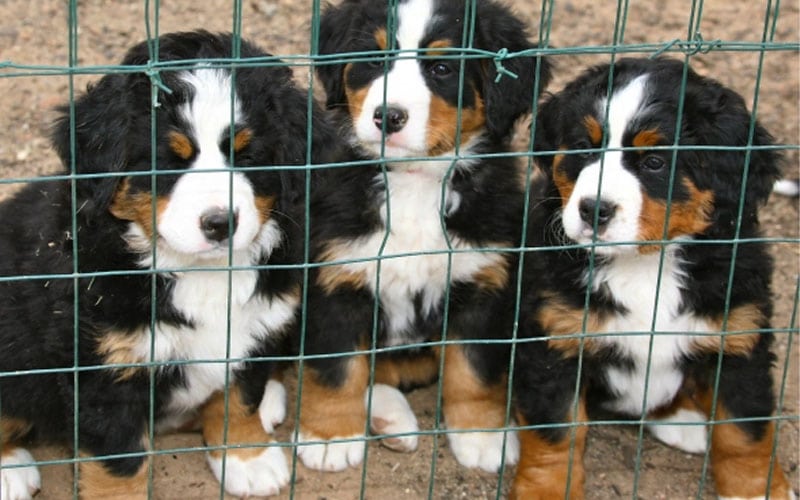
Also, shelter dogs are equally affectionate and desire to seek your affection more than any other dog you find in pet stores.
However, when you go to a shelter, make sure that:
You pay the right price; It’s not about the money, it’s about spending the deserved amount.
If you bring your shelter mountain dog home, be sure to vaccinate him within the first week of adoption.
Often times, shelter dogs are unable to receive vaccinations due to lack of money.
Bernese Dog
The Bernese Dog (German: Berner Sennenhund) is a large dog breed, one of the five breeds of Sennenhund–type dogs from the Swiss Alps. These dogs have roots in the Roman mastiffs. The name Sennenhund is derived from the German Senne (“alpine pasture”) and Hund (hound/dog), as they accompanied the alpine herders and dairymen called Senn. Berner (or Bernese in English) refers to the area of the breed’s origin, in the canton of Bern. This breed was originally kept as a general farm dog. Large Sennenhunde in the past were also used as draft animals, pulling carts. The breed was officially established in 1912.
Colouring
Like the other Sennenhund, the Bernese mountain dog is a large, heavy dog with a distinctive tri-colored coat, black with white chest and rust-colored markings above eyes, sides of the mouth, front of legs, and out around the white chest. However, it is the only breed of Sennenhund dogs with a long coat.
The ideal of a perfectly marked individual gives the impression of a white horseshoe shape around the nose, which is always black. There is a white “Swiss cross” on the chest when viewed from the front. A “Swiss kiss” is a white mark located typically behind the neck, but maybe a part of the neck. A full ring would not meet the type standard. The AKC breed standard lists, as disqualifications, blue eye color, and any ground color other than black.
Height and weight ranges
Males are 25–27.5 in (64–70 cm), while females are 23–26 in (58–66 cm). Weight is 80–120 lb (35–55 kg) for males, while it is 75–100 lb (35–45 kg) for females.
Physical traits
Considered a dry-mouthed breed, the Bernese mountain dog is slightly longer than it is tall, highly muscular, with a strong, wide back. The head of a Bernese mountain dog is flat on the top with a moderate stop, and the ears are medium-sized, triangular, set high, and rounded at the top. The teeth have a scissors bite. The legs of the Bernese are straight and strong, with round, arched toes. The dewclaws of the Bernese are often removed. Its bushy tail is carried low.
Temperament
The breed standard for the Bernese mountain dog states that dogs should not be “aggressive, anxious or distinctly shy”, but rather should be “good-natured”, “self-assured”, “placid towards strangers”, and “docile”. It only attacks if really needed (its owner is getting attacked). The temperament of individual dogs may vary, and not all examples of the breed have been bred carefully to follow the standard. All large breed dogs should be well socialized when they are puppies, and given regular training and activities throughout their lives.
Bernese are outdoor dogs at heart, though well-behaved in the house; they need activity and exercise, but do not have a great deal of endurance. They can move with amazing bursts of speed for their size when motivated. If they are sound (no problems with their hips, elbows, or other joints), they enjoy hiking and generally stick close to their people. Not being given the adequate amount of exercise may lead to barking and harassing in the Bernese.
Bernese mountain dogs are a breed that generally does well with children, as they are very affectionate. They are patient dogs that take well to children climbing over them. Though they have great energy, a Bernese will also be happy with a calm evening.
Bernese work well with other pets and around strangers. They are excellent guardians. They tend to bond with one owner or family, and are somewhat aloof and standoffish towards strangers.
History
Historically, in some locales at least, the breed was called a Dürrbachhund[13] or Dürrbächler, for a small town (Dürrbach) where the large dogs were especially frequent.[14]
The dogs have roots in the Roman mastiffs.[15][16]
The breed was used as an all purpose farm dog for guarding property and to drive dairy cattle long distances from the farm to the alpine pastures. The farmers used the dogs to transport their carts of milk and cheese and were known by the locals as “Cheese Dogs.”
In the early 1900s, fanciers exhibited the few examples of the large dogs at shows in Berne, and in 1907 a few breeders from the Burgdorf region founded the first breed club, the Schweizerische Dürrbach-Klub, and wrote the first Standard which defined the dogs as a separate breed. By 1910, there were already 107 registered members of the breed. There is a photo of a working Bernese Mountain Dog, dated 1905 at the Fumee Fall rest area in Quinnesec, MI.
In 1937, the American Kennel Club recognized it; today, the club classifies it as a member of the Working Group. In the US the Bernese Mountain Dog is growing in popularity, ranking in 32nd place by the American Kennel Club in 2013.
These dogs are very popular as family dogs in German-speaking countries, where they are among the most popular dog breeds (for example, the German Association of Dog Breeders listed the Bernese at the 11th rank per live births in 2014
Medical problems
Cancer is the leading cause of death for dogs in general, but Bernese Mountain Dogs have a much higher rate of fatal cancer than other breeds; in both U.S./Canada and UK surveys, nearly half of Bernese Mountain Dogs die of cancer, compared to about 27% of all dogs.
Bernese Mountain Dogs are killed by many types of cancer, including malignant histiocytosis, mast cell tumor, lymphosarcoma, fibrosarcoma, and osteosarcoma. Inherited medical problems that a Bernese Mountain Dog may face include malignant histiocytosis, hypomyelinogenesis, progressive retinal atrophy, and possibly cataracts and hypoadrenocorticism.
The breed is also prone to histiocytic sarcoma, a cancer of the muscle tissue that is very aggressive, and hereditary eye diseases that are common among larger dogs. A four-year-old Bernese with lymphoma named Dylan was one of the first dogs to receive chemotherapy at the Virginia-Maryland Regional College of Veterinary Medicine, and it was successful.
Bernese Mountain Dogs have an unusually high mortality due to musculoskeletal causes. Arthritis, hip dysplasia, and cruciate ligament rupture were reported as the cause of death in 6% of Bernese Mountain Dogs in the UK study; for comparison, mortality due to musculoskeletal ailments was reported to be less than 2% for pure-bred dogs in general.
Owners of Bernese Mountain Dogs are nearly three times as likely as owners of other breeds to report musculoskeletal problems in their dogs; the most commonly reported being cruciate ligament rupture, arthritis (especially in shoulders and elbows), hip dysplasia, and osteochondritis. The age at onset for musculoskeletal problems is also unusually low. In the U.S./Canada study, 11% of living dogs had arthritis at an average age of 4.3 years.
Most other common, non-musculoskeletal morbidity issues strike Berners at rates similar to other breeds. Prospective Bernese Mountain Dog owners should be prepared to cope with a large dog that may have mobility problems at a young age. Options to help mobility-impaired dogs may include ramps for car or house access, lifting harnesses and slings, and dog wheelchairs (ex: Walkin’ Wheels). Comfortable bedding may help alleviate joint pain. Due to these common medical issues, owners of Bernese Mountain Dogs should make sure that their dogs receive OFA and CERF certificates.
Bottom Line:
Let’s end the discussion with what Will Rogers has to say:
“If there are no dogs in heaven, I want to go where they went when I die.”
Are you a domestic person? Don’t forget to check out our interesting and informative pet blogs.

